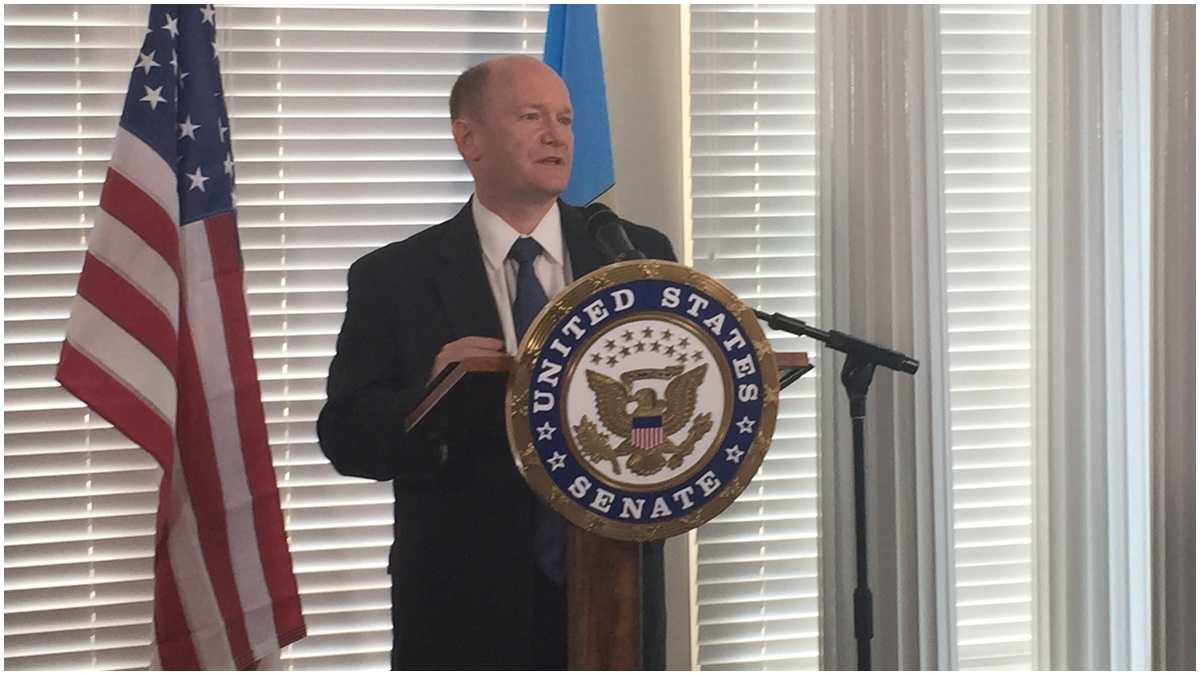Coons introduces legislation to increase low-income enrollment and graduation rates

(File/WHYY)
U.S. Sen. Chris Coons, D-Delaware, said legislation introduced today will create more opportunities for higher education students.
The Access Success and Persistence In Reshaping Education Act, or ASPIRE Act, which Coons is sponsoring with U.S. Sen. Johnny Isakson, R-Ga., aims to incentivize colleges to expand access for low-income students and increase graduation rates.
“In today’s economy, access to higher education is one of the surest ways to provide students from all backgrounds a ladder to success,” Coons said.
“That’s why the federal government invests significant resources into helping low-income and first-generation college students succeed in college. Yet despite this investment, our higher education system is failing to deliver results for the students who need it most. Our graduation rates are abysmally low and too many resource-rich colleges have failed to expand access to students who come from low-income backgrounds.”
The U.S. government spends about $180 billion each year in federal student aid and tax benefits to help low and middle-income students, according to Coons’ office. However, Coons said the federal government doesn’t require colleges to ensure high graduation rates or low-income enrollment.
Coons said he wants to “make sure there are ladders of opportunity, particularly for low-income students, and to reduce the negative pattern we see of students who get access to college but don’t complete college.”
The legislation would give colleges with low numbers of low-income students the opportunity to develop a plan to boost low-income enrollment over four years, or pay a fee to participate in the federal college loan program.
Under the bill, up to $200 million a year would be devoted to graduation efforts. Colleges with high-access but with low performance rates could receive up to $8 million over five years to improve success rates. The funding would be provided by the fees collected from schools that fail to improve low-income enrollment.
The self-financing legislation, which does not require new appropriations, also provides competitive funding for institutions with high graduation rates and high enrollment rates of low-come students. These colleges also could apply for non-financial rewards, such as bonus points in federal competitive grants or a reduced regulatory burden.
There’s an appeals process for schools that want to dispute its assessment.
“It’s designed to incentive all institutions of higher learning to focus on access and completion—areas that are not incentivized at the level we think they should be,” Coons said.
Chris Lucier, the University of Delaware’s vice president for enrollment management, said the Newark university applauds the bill’s “intent” to promote access and higher graduation rates for students with the greatest financial need.
“The intent is consistent with the University’s financial aid commitment through the “Commitment to Delawareans” and our new test optional policy, both of which are promoting access to thousands of Delawareans, as well as our investments in technology and staff to increase the retention and graduation rates for all students, particularly those from underrepresented and underserved populations,” he said in a statement.
Delaware State University said it is one of the legislation’s supporters.
“At Delaware State University we are committed to retaining and graduating first-generation college students,” said President Dr. Harry L. Williams in a statement. “This commitment is further evidenced by our steady progression on these most-important metrics and our partnerships with private foundations to expand our innovative efforts to retain and graduate our students.”
Wilmington University President Dr. Jack P. Varsalona said his institution also supports the legislation because it protects students.
“The bill ensures that students will get what they pay for: rigorous and challenging course work in solid degree programs at an affordable price,” he said in a statement.
“About 46 percent of our first-time, full-time students are PELL Grant recipients. Wilmington University is committed to making higher education affordable, ensuring our students are provided financial counseling and doing everything in our power to remove common barriers to a high quality education. The Aspire Act aligns well with this university’s mission and rich history of enabling student access to programs that can ultimately lead to greater student success.”
WHYY is your source for fact-based, in-depth journalism and information. As a nonprofit organization, we rely on financial support from readers like you. Please give today.





